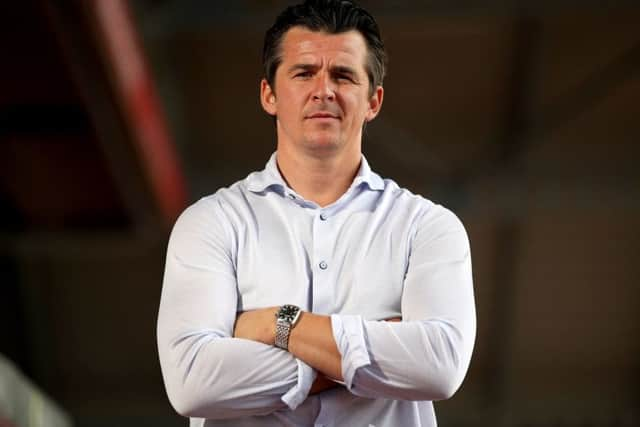Burnley's the blueprint for new Fleetwood Town head coach Joey Barton after talks with Sean Dyche
and live on Freeview channel 276
But he says it was a seed sown six years ago, when he nearly joined Fleetwood on loan from QPR, and more recently a push from his mentor and boss at Burnley Sean Dyche that led him to take on his first management role at Highbury.
Barton, 35, never planned on hanging up his boots, but after 13 months out of the game the midfielder decided that the opportunity to team up with Fleetwood chairman Andy Pilley was simply too good to turn down.
Advertisement
Hide AdAdvertisement
Hide AdBarton kept himself entertained during that time out of football by working for talkSPORT, which gave a man who has often been the subject of tabloid front-page headlines an insight into the workings of the media.


One of the first people Barton called after Pilley made contact was Dyche.
Dyche is a man Barton holds in high esteem – no surprise given he has steered Burnley to the Premier League and now Europe, a great feat.
Barton has been planning a move into coaching since he was in his 20s, and although his playing days have not ended on the terms he would have liked, he says he is raring to go in the dugout.
Advertisement
Hide AdAdvertisement
Hide AdHe said: “My plan when I was given the ban was to stay busy, stay active and find a purpose.
“That purpose for me was the media. I loved working for talkSPORT. It was a really eventful journey. I enjoyed it, I learned so much. I knew I wanted to get back into football on this side of the fence,the getting-the-hands-dirty side, the daily grind, whether that was as a player or a coach.
“At the time I wanted to go back and play. I felt like I had unfinished business. I wanted to show the FA that at 35 I could navigate the ban – not putting two fingers up at them but saying, ‘I am going to come back from this’.
“I thought it would be a huge test of my psychological and physical resolve to do that.
Advertisement
Hide AdAdvertisement
Hide Ad“Halfway through that journey, Andy phoned me and said, ‘Would you be interested in a coaching job at Fleetwood?’
“Initially I thought, ‘No, I want to go back to Burnley’, which was always the plan – to do pre-season with them and see if I could get back in their side.
“When I sat down and discussed it, Sean Dyche was the first person I spoke to about it.
“I said. ‘What do you think?’ I was thinking he’d say, ‘No, come back to Burnley’ or ‘No, you need to come and be a part of my staff or be part of Burnley’, just because of the rapport we had together.
Advertisement
Hide AdAdvertisement
Hide Ad“He was like, ‘You have to go and do that. You are going to be really good at that. It is a great opportunity for you’.
“After that, I thought, “Yeah, I have got to go and do that’.
“I’d kind of reached that decision on my own, but then to have someone you have an enormous amount of respect for give you that kind of pat on the back and confidence boost, I thought, ‘Yeah, I’ve got to do this’.”
And that successful model at Burnley is something Barton will take inspiration from as his era at Highbury begins.
Advertisement
Hide AdAdvertisement
Hide AdAs one of the leaders in Dyche’s squad, it seems Barton was already on the pathway to coaching.
He added: “If you have spent time in any good environment, you want to replicate that.
“I always saw myself as a coach and a manager on the pitch. At Burnley, me and the manager were so close because you have that kind of playing group. You have the kind of ‘leaders and generals’ group that were brought into discussions.
“I was always part of that and felt that respect was born both ways. I was asked my opinion on lots of things, and the Burnley journey is a model of excellence.
Advertisement
Hide AdAdvertisement
Hide Ad“After Burnley finished seventh with their budget, especially in the ultra-competitive world of Premier League football, for me he was the manager of the year. It was the phenomenal achievement.
“It would be foolish of me not to bring the good things from that environment, which there were many of, but there are also things I thought I would do slightly differently.
“Burnley is an exceptional model and was a model for a 46-game season when we won the Championship. That model would be useful in a 46-game season in League One.
“Obviously we have other factors in terms of the cup competitions, but if you know what ‘good’ looks like and feels like, you would be foolish not to use it.”